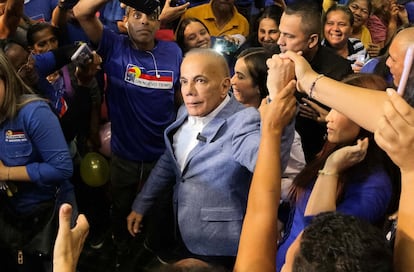Venezuelan opposition seeks to rebuild itself after the trauma of candidate registration
María Corina Machado’s close circle accuses Manuel Rosales of betrayal after he registered by surprise at the last minute. The governor of Zulia said he is prepared to hand the candidacy to someone who can ‘overcome the government’s obstacles’

In broad sectors of the Venezuelan opposition, there is enormous discontent at the unilateral decision made by Manuel Rosales — the governor of the state of Zulia and leader of the political party Un Nuevo Tiempo (A New Era) — who surprised everyone on Monday night by breaking ranks and registering as a candidate for the presidential elections scheduled for July 28.
The opposition consensus forged by María Corina Machado around the academic Corina Yoris, her replacement, had collapsed. As the registration deadline given by the National Electoral Council approached, a second opposition candidate, the social democratic leader Enrique Márquez, also managed to sign up for an election that has been fraught with obstacles in what many observers see as moves by President Nicolás Maduro to make sure he wins re-election despite rock bottom approval ratings.
This episode, which has been repeated many times in the past within the different factions of the opposition, has dropped like a cluster bomb. Machado, in one of her public speeches in recent days, was clear about this: “There are many people who feel that they have been made fun of. What just happened cannot be minimized. Betrayals and disappointments become learning experiences to keep forging ahead.”
Election authorities had denied access to the registration website to Corina Yoris, the candidate that the opposition coalition, known as the Unitary Platform, had chosen to replace Machado, herself disqualified from running in a highly controversial move by Venezuelan authorities. Machado had emerged as the clear winner of the opposition primaries in October of last year.
Instead, authorities allowed Rosales, a moderate leader who has called for the end of international sanctions against Venezuela, to access the digital key allowing him to register online as a candidate to run against Maduro, who has now been in power for 11 years and is likely to remain there for another six.
Rosales and his followers defend that this was the only way to allow the democratic forces to continue on the electoral path. Supporters of Un Nuevo Tiempo consider that in recent days all other possible options had been exhausted. Rosales himself has stated that he would be willing to give up his candidacy. “Look for a candidate who will overcome the obstacles that the government puts in place and I will give you the candidacy,” he said at a party rally in Maracaibo.
The governor has the backing of a few minority sectors of the opposition with ties to academia and Chavismo dissidence, who strongly resist Machado’s leadership. These factions insist on the idea of participating in the regime’s electoral events at any cost and avoiding protests and street violence. Rosales has also received support from Fuerza Vecinal, an organization that controls the municipalities of eastern Caracas, dominated by the opposition but criticized by some sectors for its alleged links with Chavismo.
Both Rosales’ Un Nuevo Tiempo and Fuerza Vecinal are members of the Unitary Platform, and therefore, they are supposed to be committed to democratic change and the restoration of the spirit of the National Constitution. Omar Barboza, executive secretary of the Platform, also belongs to Un Nuevo Tiempo. But in a country accustomed to disappointments, what just happened is being viewed as a deal between Rosales and Maduro to whitewash the already highly questioned presidential election.
Unlike Corina Yoris, a scholar with no political activity, it is very unlikely that Rosales — a politician with his own objectives and very keen not to lose his relations with the government — will agree to the terms of María Corina Machado, around whose leadership the desire for change now revolves.
In the end, after the registration deadline had expired, the National Electoral Council offered an extension that allowed the Unitary Platform to quickly register a candidate, the diplomat Edmundo González Urrutia, who has been described as a “temporary solution.” Now that the Unitary Platform officially has a slot in the election, it could still switch candidates until 10 days before the vote, so in the coming weeks the opposition will debate how to proceed.
Although unable to conceal her fury at what happened, Machado asked her followers for “a lot of serenity and firmness.” Her attitude will mark the next decisions and, thanks to her enormous popular influence, will define the role of the opposition in an election where President Maduro and his circle refuse to play fair.
Sign up for our weekly newsletter to get more English-language news coverage from EL PAÍS USA Edition
Tu suscripción se está usando en otro dispositivo
¿Quieres añadir otro usuario a tu suscripción?
Si continúas leyendo en este dispositivo, no se podrá leer en el otro.
FlechaTu suscripción se está usando en otro dispositivo y solo puedes acceder a EL PAÍS desde un dispositivo a la vez.
Si quieres compartir tu cuenta, cambia tu suscripción a la modalidad Premium, así podrás añadir otro usuario. Cada uno accederá con su propia cuenta de email, lo que os permitirá personalizar vuestra experiencia en EL PAÍS.
¿Tienes una suscripción de empresa? Accede aquí para contratar más cuentas.
En el caso de no saber quién está usando tu cuenta, te recomendamos cambiar tu contraseña aquí.
Si decides continuar compartiendo tu cuenta, este mensaje se mostrará en tu dispositivo y en el de la otra persona que está usando tu cuenta de forma indefinida, afectando a tu experiencia de lectura. Puedes consultar aquí los términos y condiciones de la suscripción digital.








































